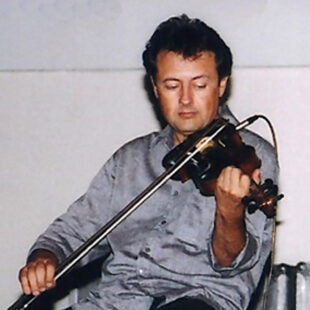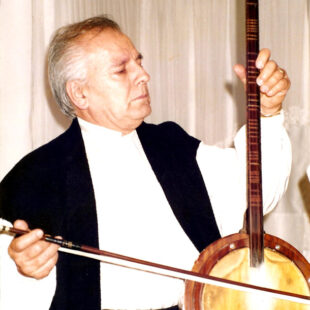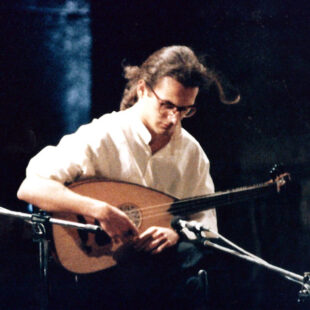00:00
Home / Her Work / Song Catalogue / A Trader Made His Way
A trader made his way from Bulgar lands.
He led his trains of twelve and fifteen mules
and sang and spoke the while he trekked along:
“A pity brigands don’t frequent these hills”.
No sooner said and three confronted him,
[and cut the ropes and started to unload.
“Good lads, let well alone, don’t cut the ropes,
I’m tired and weary of securing loads”.]
One hit him with a sword, one with a stave,
the third, his brother, struck him on the head;
[he stabbed him with a knife, then questioned him:
“Young man, where are you from, where is your home?”
“My mother’s from the East, my father from the West.
I had a brother once, a brigand chief”.
He took him in his arms and sought the leech.
“Physician, you have cured both hewn and hacked”.
“Both many hacked I’ve cured and many hewn.
This though is a brother’s stab and knows no cure”.]
Translated by John Leatham
Πραματευτής κατέβαινε της Βουργαριάς τα μέρη.
Σέρνει μουλάρια δώδεκα και μούλες δεκαπέντε·
εκεί που πάει και τραγουδάει, εκεί που πάει και λέει:
«Κρίμα σε τούτα τα βουνά και κλέφτες να μην έχουν».
Κι ευτύς παρουσιάστηκαν τρεις κλέφτες εμπροστά του
[κι αρχίσαν ξεφορτώματα και τα σκοινιά να κόβουν.
«Ν’ αφήστε, βρε καλά παιδιά, και τα σκοινιά μη κόβτε,
βαρέθηκα, μπιζέρισα να δένω, να φορτώνω».]
Ένας τον χτύπα με σπαθί κι ο άλλος με κοντάρι
κι ο τρίτος τ’ αδερφάκι του του χτύπα στο κεφάλι.
[Μια μαχαιριά τον έσυρε κι ύστερα τον ρωτάει:
«Νέε, και πού ’ν’ τα μέρη σου, ’πό πού ’ν’ τα γονικά σου;»
«Η μάνα μ’ απ’ την Ανατολή κι ο κύρης μ’ απ’ τη Δύση·
είχα κι ένα καλό αδερφό στους κλέφτες καπετάνιος».
Στην αγκαλιά τ’ τον άρπαξε και στον γιατρό τον πάει.
«Γιατρέ μ’, πολλούς εγιάτρεψες κομμένους και σφαγμένους».
«Πολλούς σφαγμένους γιάτρεψα, πολλούς μαχαιρωμένους
αυτή ’ναι αδερφομαχαιριά και γιατρεμό δεν έχει».]
A widely known song throughout the Greek world. The fact that it has survived even among the Greek-speaking inhabitants of Corsica led S. Baud-Bovy to conclude that the song predates 1675, when Maniots from the Peloponnese migrated there. N. G. Politis suggested that the two brothers in conflict were originally warriors, and that the song probably belongs to the so-called acritic cycle.
The ancient theme of siblings or spouses who meet without recognizing each other —often with tragic or nearly tragic consequences— is found frequently in both folktales and songs. When the protagonists are men, the story typically ends in the death of one brother or in mutual killing. When the siblings are of opposite sexes, they face the danger of committing an incestuous marriage, which is usually avoided thanks to last-minute recognition.
The expression of such a timeless collective fear, beyond everything else, seems to reflect the social fluidity —and therefore the anxiety— of the communities that created these songs when faced with the threat of the dissolution of family and communal bonds. This estrangement among members was caused by war, raids, captivity, forced conscription, migration, and so on.
Miranda Terzopoulou (2008)
Live recording from the concert The Known and the Unknown Domna, held on 29 October 1998 at the Megaron —
the Athens Concert Hall. Domna Samiou learned the song in the 1960s from the Chiot vocalist Zacharias Mikedis.
Watch a different version of the song by Domna Samiou

Singers

Violin

Bowed tambouras

Constantinopolitan lute

Bendir (frame drum)